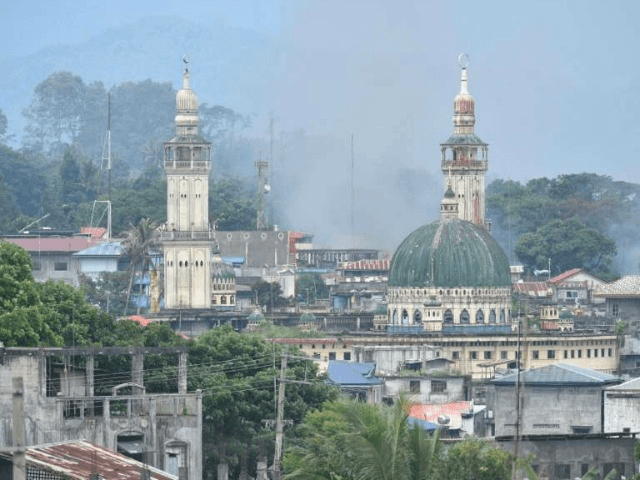Philippines president Rodrigo Duterte told reporters Wednesday that, following the liberation of the Grand Mosque of Marawi, the nation’s military could now bomb mosques, madrassas, and other hiding centers to finally eliminate the Islamic State presence in the city.
Marawi is the Philippines’ only official Islamic city, as over 90 percent of the country identifies as Roman Catholic. The Maute Group and Abu Sayyaf, local Islamic State affiliates, attacked the city in May, taking hostages, killing civilians, and selling many as sex slaves. The Philippine military stated this week that it is organizing a final siege to remove all ISIS terrorists from the city.
Duterte told the military on Wednesday that “the option is already yours” to bomb any remaining ISIS strongholds “because we cannot have stalemate [sic] for over one year,” according to regional website Rappler.
“It will generate more hatred, instead of healing, but it’s taking so long, it’s out of my hands already,” he lamented. In announcing the tactical change, Duterte noted that the military had requested the ability to bomb mosque and other sensitive sites in the past, including locations where their intelligence indicated the Islamic State was keeping hostages. “That plan has been on deck for a long time—to bomb mosques to capture or kill the leaders there and in the process sacrifice the hostages,” he explained, “But I have my limits.”
Duterte added that he had sent negotiators to speak to the Maute terrorists in the hopes of forcing them to release their hostages.
The president also noted that the military had drafted a plan to bomb the city’s Grand Mosque before they managed to liberate it using infantry.
“I will admit to you now why the siege has been so long,” Duterte explained in his characteristic mix of English and Filipino, noting that the plan existed to “sacrifice the hostages, who are all Filipinos, maybe Maranaos and mingling of Christians, Tagalog.” He refused because “it will just create more animosity and outright hostility towards the government.”
Gen. Eduardo Año, chief of staff of the Armed Forces of the Philippines, confirmed the Grand Mosque’s liberation on Tuesday. “Deliberately we are taking their strongholds, especially the Grand Islamic Mosque. We are happy to say that we were able to preserve it and we didn’t bomb it,” he said. “We didn’t let soldiers go inside. In fact, services are now being conducted there. Our Muslim soldiers and policemen are able to offer prayers at the mosque.”
Año told reporters that, as the 100th day of the battle for Marawi approaches, the military has planned “one big battle” to take back the remaining corner of the city in Islamic State hands. He estimated that 40 ISIS terrorists remain in Marawi. Año told reporters he believes key ISIS leaders, like the Maute brothers that lend that group its name or Abu Sayyaf chief Isnilon Hapilon, remain in Marawi.
Duterte made another personal visit to Marawi following the liberation of the Grand Mosque. “I am here once again to show—not just say—my unity with you,” he said to the soldiers fighting there. “That much as you all are willing to die for your country with unquestioning resolve to follow the orders to ‘Charge!’ coming from your commander-in-chief, I am and I can be in the same muddy ground that you now stand; drenched like you under the same rain and somehow smell like you in this battleground.”
A security official told the Philippine Inquirer that Duterte made the decision to visit at laste-minute and “it was really a security risk but the President threw all caution away and went ahead with his visit that made him see the real score on the ground.”
The leaders of the Philippines, Indonesia and Malaysia may meet to discuss international terrorism, President Rodrigo Duterte said Wednesday, as Filipino troops plan their final assault against Islamic State-styled militants in Marawi City.

COMMENTS
Please let us know if you're having issues with commenting.